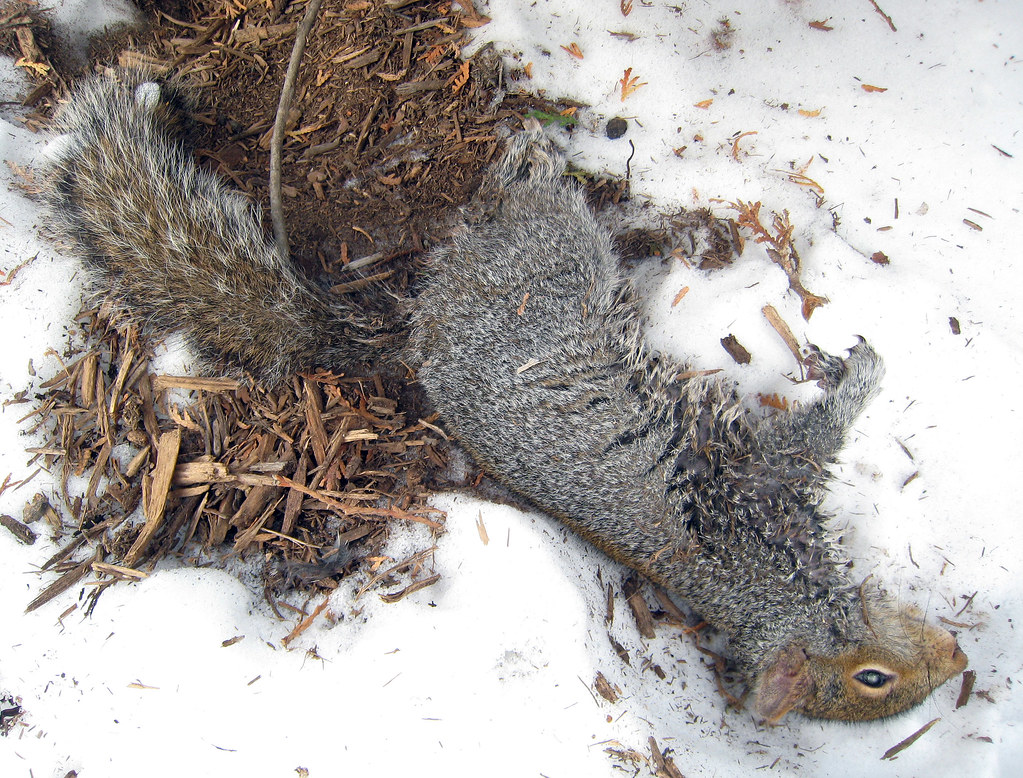Spring’s first thaw warms the dead of winter with sour smells. Footsteps through slop, slabs of ice sliding off roofs, explosions in knee-deep muck, tufts of fur worn in the ground. When Molly Henry surveys the spring-time wretchedness of her Saskatchewan ranch in Wolf Willow, Wallace Stegner captures it well: “Matted, filthy, lifeless, littered, the place of her winter imprisonment was exposed, ugly enough to put gooseflesh up her backbone, and with a carrion smell over all of it.”
Here in town it’s not as bad, since you don’t have to breathe in the stench of rotting cattle carcasses. When it’s warm and windy and the sun’s shining, it’s great to get out for a walk. But as each layer of snow melts, you’ll find fresh depositions of neighborhood garbage—dog shit, frozen squirrels, uncollected ARC bags. Across the street, there is a pile of socks and briefs emerging from the snow bank, a frozen slab of undergarments still stiff enough to break a side mirror.
Sometimes I’ll find a frozen songbird thawing in the sun, but usually it’s squirrels. I’ve thought about eating them before, but I’m not sure they’re safe. A few days will go by and nothing else touches them, not even the local hawks, raccoons, or cats. I bag them up, reverently as possible (any creature that fails to survive a Minnesota winter deserves some respect), and throw them in the trash.
I’ve never actually eaten squirrel before, but my grandparents did during the Depression. Whenever I ask about it they change the subject. Since my own backyard produces a plethora of squirrels, it seems like a good opportunity for “urban foraging.” From April to October, the squirrels fatten on whatever seasonal crops are growing in the garden. Sometimes they find their way into the garden's chicken-wire enclosure, and then can’t find their way out. They’re like bank robbers trapped in a vault.
When my dad was a kid, he worked for the maintenance division at an Oscar Mayer slaughterhouse. As the team’s youngest member, he was assigned all the gross jobs like cleaning out blood gutters on the kill floor. That was back when employers offered their workers benefits. Each year, Oscar Mayer provided a four-year scholarship to whichever employee scored highest on the SAT. Oscar Mayer paid his way through college.
At Iowa State, where he studied, they had a conveyor belt in the dining hall to take dirty dishes back to the kitchen. One time, him and his friends got a pig head from the plant and placed it on a greasy plate as it clattered into the wash room. A few seconds later, screams and the crash of broken glass erupted from the other side of the wall.
These days, pig heads, offal, feet, and faces are fashionable frontiers of the food world. In the last decade, Anthony Bourdain, Fergus Henderson, Michael Ruhlman, and other celebrity chefs and food-writers have popularized the lost arts of charcuterie and “nose-to-tail” cookery. Tonight, thousands of hopeful lovers will take a risk and order head-cheese on their Valentine’s Day dinner dates.
This renaissance, however, is taking some criticism. In particular, B.R. Myers’ “moral crusade” last week against foodie-ism in the Atlantic has raised a stir. Over the course of a long column, Myers seems to indict just about everyone who enjoys eating as a glutton, especially when it comes to meat, an ultimate source of “caloric wastefulness and environmental damage.” Clearly, “Myers is sitting very high on his horse,” as Robert Sietsema points out in a hilarious rebuttal: “Well, he can’t actually sit on the horse because that would be cruel.” It almost goes without saying that Myers is one of those vegans whose righteousness seems to impair his broader ethical senses.
But I do agree with Myers that the eating public, “foodies” included, should spend more time understanding the environmental and ethical consequences of their food habits. Despite his use of cherry-picked quotations, Myers does a fair job demonstrating the ridiculous explanations that certain food writers have provided to justify their voracious appetites for foods ranging from goat testicles to endangered species. But other than the typical vegan responses, I wonder what Myers would say about the damage or wastefulness of eating a ubiquitous backyard squirrel?
I've thought about it, but I probably won't do it, even though they eat all the strawberries. I don't have the heart to kill one with a garden spade, and I'd be too embarrassed if a .22 ricochet broke my neighbor's window. These are tough, well-fed squirrels anyway, and I don't know if a pea-shooter is up to the task. I've seen them get run over by trucks and shake it off. Sometimes they even survive the winter.





No Response to "Whole Squirrel: The World is Your Freezer and Defroster"
Post a Comment